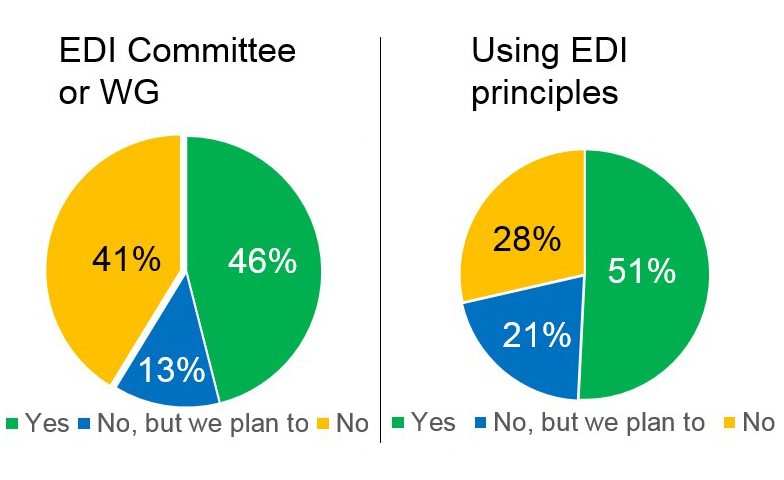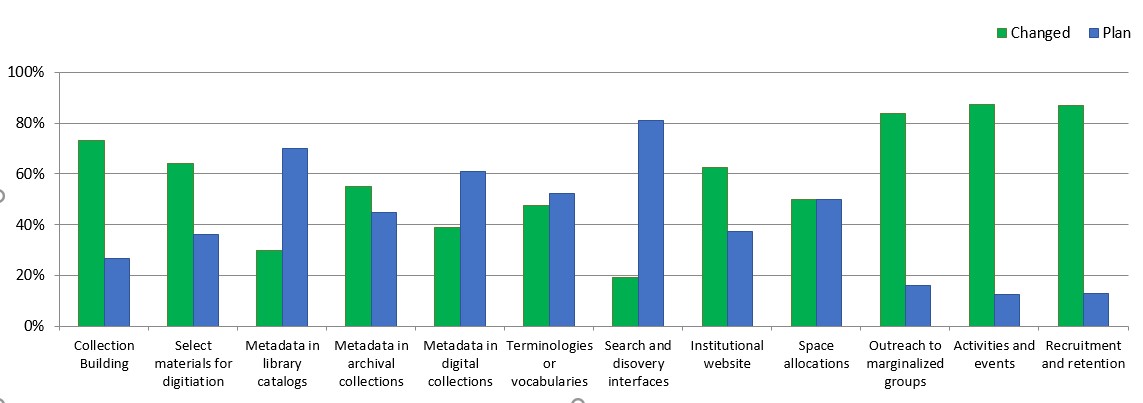Equity, Diversity, and Inclusion in the
OCLC Research Library Partnership Survey
Overview
In 2017, the OCLC Research Library Partnership (RLP) conducted a survey to explore if and how our 150 Partner institutions are modifying library and archival collections, practices, and services through the lens of equality, diversity, and inclusion (EDI). Our objective was to capture a snapshot of efforts across the Partnership to inform next steps, reveal possible directions to explore, and serve as a starting point for further discussions and action regarding EDI in the library field.
We conducted the survey in September and October 2017 and received 63 responses, constituting 42% of RLP members. We then posted a summary of the data on our HangingTogether blog and presented a fuller summary at our November 2017 RLP regional meeting in Baltimore.
The survey was developed In consultation with Sharon Farnel, chair of the University of Alberta Libraries' Decolonizing Descriptions Working Group.
Highlights
Key highlights from the survey results:
- 59% of the respondents had set up or plan to set up an EDI committee or working group.
- 72% were using or planned to use EDI goals and principles to inform their collections' workflows, practices, or services.
- Of those who responded they were using or planned to use EDI goals, 79% were working with other institutions, organizations, or community groups on EDI to improve representation of marginalized groups in collections, practices, or services.
- The top three areas that 80% or more of the respondents had already changed due to their institutions' EDI goals and principles were:
- Activities and events
- Recruitment and retention
- Outreach to marginalized communities
- The top two areas where 70% or more of the respondents planned to change but haven't yet were:
- Search and discovery interfaces
- Metadata descriptions in library catalogs
Survey Findings
The survey asked nine questions, and we received 63 responses from institutions in nine countries: United States (36), United Kingdom (13), Australia (6), Canada (3), Germany (1), Hong Kong (1), Italy (1), Japan (1), and the Netherlands (1).
1. Has your library and/or archive established an EDI committee or working group?
2. Is your library and/or archive using EDI goals and principles to inform your collections' workflows, practices, or services?
59% of respondents have established or plan to establish an EDI committee or working group, and 72% are using or plan to use EDI goals and principles to inform their collections, practices, or services.

3. Is your library and/or archive working with other institutions, organizations, or community groups on EDI to improve representation of marginalized groups in collections, practices or services?
Most (79%) responded that they are working with other institutions, organizations or community groups to improve representation of marginalized groups.
4. Which areas have you changed or plan to change due to your institution's EDI goals and principles? (12 options given)
These are the seven most common areas in which changes have been made:
- Activities and events (88%)
- Recruitment and retention (87%)
- Outreach to marginalized communities (84%)
- Collection building (73%)
- Selection of materials for digitization (64%)
- Institutional website (63%)
- Metadata descriptions in archival collections (55%)
Metadata descriptions are being changed more for archival materials than for those in library catalogs, digital, or digitized collections.
These are the top four areas that respondents plan to change in the future:
- Search and discovery interfaces (77%)
- Metadata descriptions in library catalogs (70%)
- Metadata descriptions in digital or digitized collections (58%)
- Terminologies and/or vocabularies (52%)
Responses regarding space allocations were evenly split: 50% have made changes and 50% plan to do so.

5. Please list targeted activities and audiences your EDI's goals and principles are or will be focused on addressing. For example, "My library is working with local tribal communities to incorporate appropriate labels in our digitized indigenous peoples collections."
Sample responses:
- "Curators are working with marginalized communities to acquire materials for our collections. These groups include Hispanics and Native Americans. We have also begun discussions about how to include these groups in the description of materials. This is especially important for Hispanics where a different language is involved." (Bringham Young University)
- "We are also looking at space planning efforts and considering how diversity and inclusion values impact how we look at and deploy space - including spaces for reflection, all-gender restrooms but also in terms of accessibility and proximity to resource centers supporting traditionally marginalized communities." (University of Arizona)
- "USC Libraries will be ensuring collections are replete with works from diverse viewpoints, this is critical to the success of the university in general and its D & I efforts in particular."
6. Please list, including URLs, any publicly-available presentations, web pages, papers, or articles describing your EDI efforts.
Respondents replied with an impressive list of resources.
7. What have been your institution's biggest challenges in your EDI efforts?
Some respondents noted that developing a positive work climate and establishing a shared understanding of diversity, equity, and inclusion among staff would help with recruitment and retention of a more diverse staff. Respondents indicated incorporating EDI values as an integral part of everyone's work, and having the time, funding, and resources to achieve their goals, are also key.
Sample responses:
- "Building relations and trust with marginalized groups. Many groups do not feel comfortable working with or being documented by University departments."
- "Not appropriating the efforts of our underrepresented communities, while administering and guiding the programs."
- "Changing our primarily conflict-adverse faculty and staff to a culture where all individuals are respected for their identity, difficult conversations are encouraged and conflict is seen as part of our daily lives–neither good nor bad, simply something to be positively addressed and resolved."
8. What do you think are the biggest challenges for the library and archival communities to ensure equity, diversity, and inclusion of marginalized groups?
Building trust, recruiting and retaining a diverse staff, and funding were three recurring themes.
Sample responses:
- "Making changes needed in the absence of adequate targeted resources to do so. OCLC could help with this effort by centralizing some of the advocacy and change management needed for general activities in the library and archival world that are not specific to individual institutions."
- "Understanding the whiteness of our profession and how that affects and undergirds everything we do from recruiting, hiring, and promotion to networking, mentoring, and definition of professionalism to collecting and description to interpersonal communication, building relationships, and providing services, etc."
- "Getting electronic database vendors to meet accessibility standards to service our disabled customers."
9. What are your institution's views on EDI efforts?
The 28% of respondents that are not using EDI goals and principles were asked for their institution’s views on EDI efforts. The responses were supportive of EDI goals, but the parent institution rather than the library was generally in the lead.
Sample responses:
- "They are necessary to encourage change in the workplace and the pool of applicants for available positions, as well as curating collections of broader appeal."
- "We are already there with incredible diversity on all dimensions, and working very hard to improve in particular the numbers of women in science."
- "We aspire to an inclusive approach to all we do and champions within areas of the library and useful networks and contacts to support this. What we don’t have is a separate/formalised working group in the Library. We do, however, take an active part in the University's and regional library networks."
Outputs
Blogs
Equity, Diversity, and Inclusion (EDI)
A summary blog post about the survey.
Hanging Together | November 27, 2017
by Karen Smith-Yoshimura
OCLC Research Library Partnership
The OCLC Research Library Partnership is a venue for research libraries to undertake significant, innovative, collective action to benefit scholars and researchers everywhere. The Partnership magnifies the leadership and direction provided by innovative libraries. OCLC recognizes the valuable contribution that research libraries play in the cooperative and supports the Partnership with the full capacities of OCLC Research.
Definitions
Early in our work, we consulted the definitions in the American Library Association’s Statement on Equity, Diversity and Inclusion:
“Equity” takes difference into account to ensure a fair process and, ultimately, a fair outcome. Equity recognizes that some groups were (and are) disadvantaged in accessing educational and employment opportunities and are, therefore, underrepresented or marginalized in many organizations and institutions. Equity, therefore, means increasing diversity by ameliorating conditions of disadvantaged groups.
“Diversity” can be defined as the sum of the ways that people are both alike and different. When we recognize, value, and embrace diversity, we are recognizing, valuing, and embracing the uniqueness of each individual.
“Inclusion” means an environment in which all individuals are treated fairly and respectfully; are valued for their distinctive skills, experiences, and perspectives; have equal access to resources and opportunities; and can contribute fully to the organization’s success.